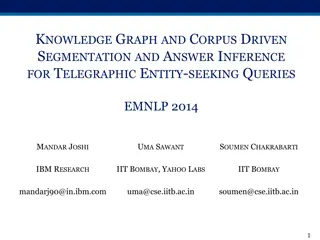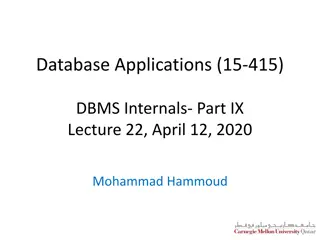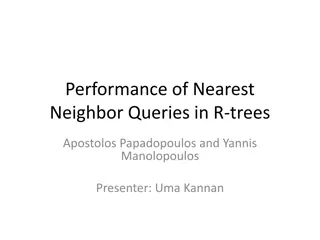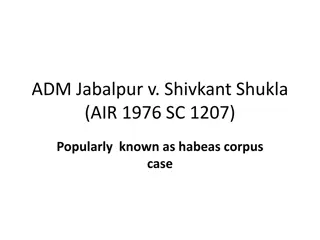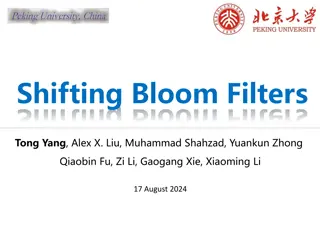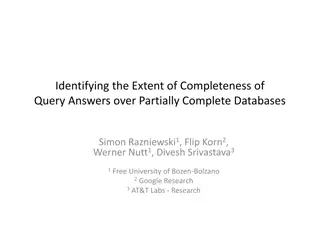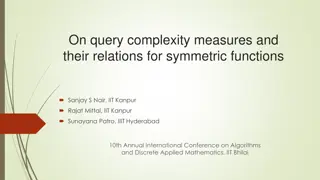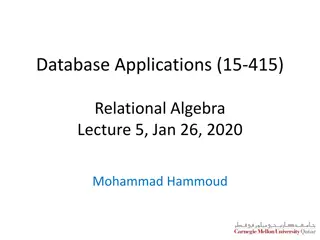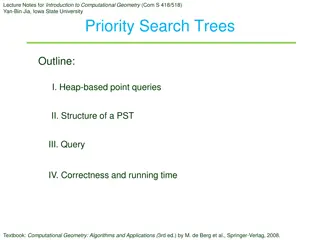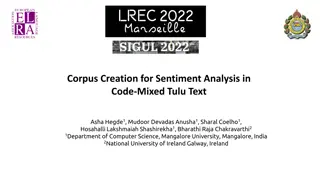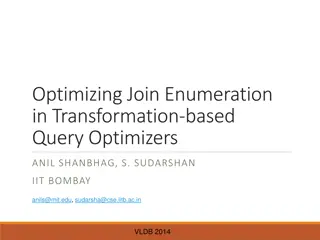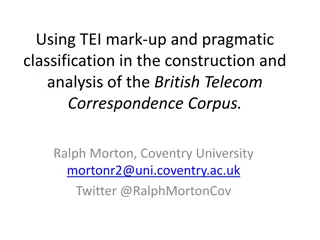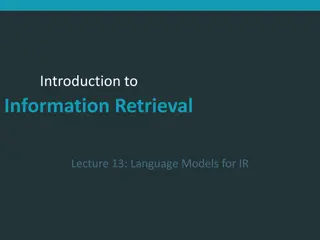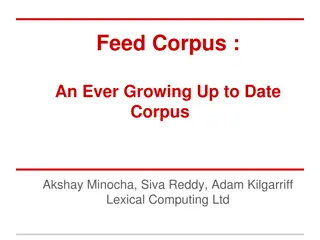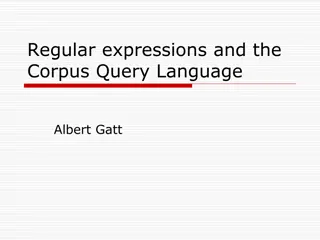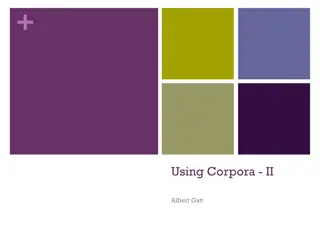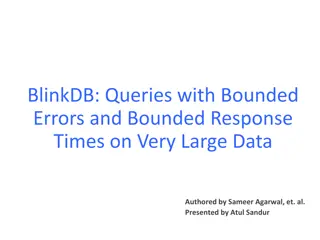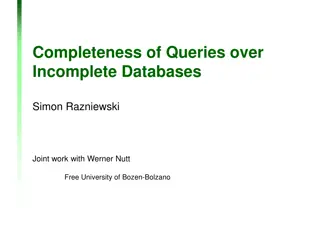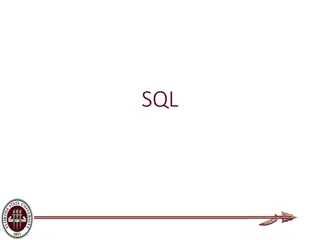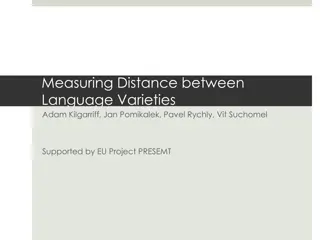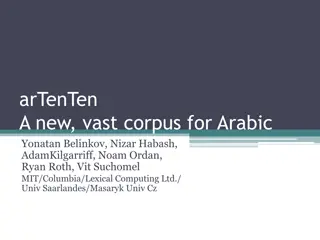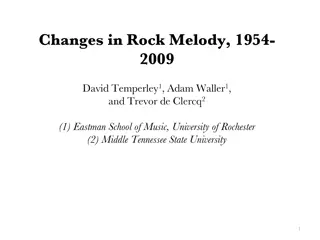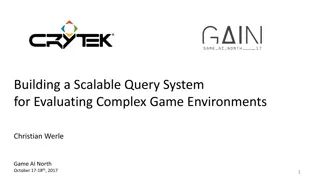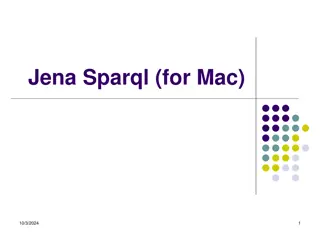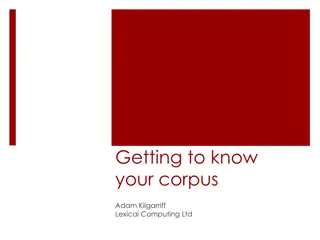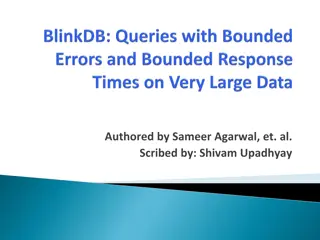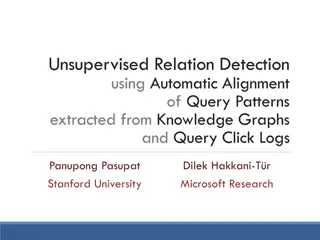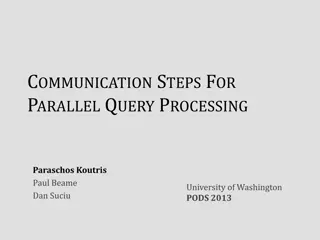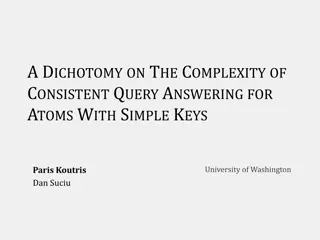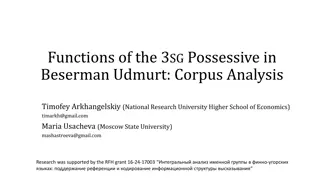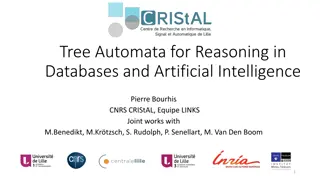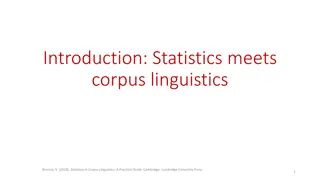Enhancing Query Optimization in Production: A Microsoft Journey
Explore Microsoft's innovative approach to query optimization in production environments, addressing challenges with general-purpose optimization and introducing specialized cloud-based optimizers. Learn about the implementation details, experiments conducted, and the solution proposed. Discover how
2 views • 27 slides
Knowledge Graph and Corpus Driven Segmentation for Entity-Seeking Queries
This study discusses the challenges in processing entity-seeking queries, the importance of corpus in complementing knowledge graphs, and the methodology of segmentation for accurate answer inference. The research aims to bridge the gap between structured knowledge graphs and unstructured queries li
0 views • 24 slides
Efficient Budget Query Process in Self-Service Banner 9.0
Accessing and navigating the Self-Service Banner 9.0 for budget queries can be simplified by following a step-by-step guide. From initiating a new finance query to selecting relevant columns and submitting the query, this process ensures accuracy and efficiency in tracking budget status by account.
0 views • 19 slides
Query Optimization in Database Management Systems
This content covers the fundamentals of query optimization in Database Management Systems (DBMS), including steps involved, required information for evaluating queries, cost-based query sub-system, and the role of various components like query parser, optimizer, plan generator, and cost estimator. I
0 views • 51 slides
Understanding Active Learning in Machine Learning
Active Learning (AL) is a subset of machine learning where a learning algorithm interacts with a user to label data for desired outputs. It aims to minimize the labeling bottleneck by achieving high accuracy with minimal labeled instances, thus reducing the cost of obtaining labeled data. Techniques
0 views • 17 slides
Performance of Nearest Neighbor Queries in R-trees
Spatial data management research focuses on designing robust spatial data structures, inventing new models, constructing query languages, and optimizing query processing. This study explores the estimation of query performance and selectivity, specifically in R-trees, for efficient access planning.
1 views • 32 slides
ADM Jabalpur v. Shivkant Shukla: Habeas Corpus Case Analysis
During the Emergency in 1975, the ADM Jabalpur v. Shivkant Shukla case examined the suspension of certain fundamental rights by the Indian government. The issue revolved around the legality of detentions under preventive laws and the right to habeas corpus. The Supreme Court's decision in this case
0 views • 13 slides
Shifting Bloom Filters at Peking University, China
Explore the innovative research on Shifting Bloom Filters conducted at Peking University, China, featuring evaluations, conclusions, background information, and insights on membership, association, and multiplicity queries. The study delves into hash functions, theoretical results, and the Shifting
1 views • 25 slides
Identifying Completeness of Query Answers in Incomplete Databases
The study delves into how to assess the completeness of query answers when dealing with partially complete databases. By analyzing data from a telecommunication company’s data warehouse, the query results are examined to determine if all warnings generated by maintenance objects with hardware team
0 views • 23 slides
Quantum Query Complexity Measures for Symmetric Functions
Explore the relationships between query complexity measures, including quantum query complexity, adversary bounds, and spectral sensitivity, in the context of symmetric functions. Analysis includes sensitivity graphs, the quantum query model, and approximate counting methods. Results cover spectral
0 views • 19 slides
Understanding Relational Query Languages in Database Applications
In this lecture, Mohammad Hammoud discusses the importance of relational query languages (QLs) in manipulating and retrieving data in databases. He covers the strong formal foundation of QLs, their distinction from programming languages, and their effectiveness for accessing large datasets. The sess
0 views • 39 slides
Introduction to Priority Search Trees in Computational Geometry
This lecture outlines the structure and query process of Priority Search Trees (PST) in computational geometry. It covers heap-based point queries, range trees for windowing queries, handling query ranges in 1D and 2D spaces, and using heaps to efficiently handle query ranges. The content discusses
1 views • 18 slides
Corpus Creation for Sentiment Analysis in Code-Mixed Tulu Text
Sentiment Analysis using code-mixed data from social media platforms like YouTube is crucial for understanding user emotions. However, the lack of annotated code-mixed data for low-resource languages such as Tulu poses challenges. To address this gap, a trilingual code-mixed Tulu corpus with 7,171 Y
0 views • 10 slides
Understanding Corpus Linguistics in Web Research
Explore the world of corpus linguistics through Adam Kilgarriff's research, delving into the definition of a corpus, its historical background, types, parameters, and the vastness of linguistic data available on the web since the 1960s. Discover the significance of corpora in various fields such as
0 views • 19 slides
Optimizing Join Enumeration in Transformation-based Query Optimizers
Query optimization plays a crucial role in improving database performance. This paper discusses techniques for optimizing join enumeration in transformation-based query optimizers, focusing on avoiding cross-products in join orders. It explores efficient algorithms for generating cross-product-free
0 views • 18 slides
Using TEI Mark-up and Pragmatic Classification in British Telecom Correspondence Corpus
Construction and analysis of the British Telecom Correspondence Corpus involving TEI mark-up and pragmatic classification. The project explores the history and preservation of BT archives, focusing on the digitization and cataloging of documents, photographs, and correspondence for easier access and
0 views • 45 slides
Understanding Menstruation and Ovulation Cycle in Women
Menstruation, the cyclic uterine bleeding, is a result of hormonal interplay. It signifies ovarian events controlled by the hypothalamic-pituitary axis. The menstrual cycle, spanning from one period to the next, involves the release of ova and hormones like estrogen and progesterone. Menstruation ty
0 views • 49 slides
Enhancing Query-Focused Summarization with Contrastive Learning
The study explores incorporating contrastive learning into abstractive summarization systems to improve discernment between salient and non-salient content in summaries, aiming for higher relevance to the query. By designing a contrastive learning framework and utilizing segment scores, the system c
0 views • 16 slides
Language Models for Information Retrieval
Utilizing language models (LMs) for information retrieval involves defining a generative model for documents, estimating parameters, smoothing to avoid zeros, and determining the most likely document(s) to have generated a query. Language models help rank documents by relevance to a query based on p
0 views • 20 slides
Unveiling the Feed Corpus: A Comprehensive Study
Explore how the Feed Corpus tackles the challenge of monitoring language evolution over time by discovering, validating, and scheduling feeds from sources like Twitter. The methodology involves linguistic processing, de-duplication, and more to build an ever-growing, up-to-date database. Witness the
0 views • 15 slides
Understanding Regular Expressions and the Corpus Query Language
This content introduces regular expressions and the Corpus Query Language (CQL) developed by the Corpora and Lexicons Group at the University of Stuttgart. It explains how to use regular expressions and CQL to search for specific patterns in text, providing practical tools and examples.
0 views • 41 slides
Practical Tools for Corpus Search Using Regular Expressions and Query Languages
These notes explore practical tools for corpus search including regular expressions and the corpus query language (CQL/CQP). They provide an introduction to using corpora effectively for pattern identification, with examples and explanations. The guide includes information on levels of annotation an
0 views • 47 slides
Enhancing English Language Learning for Graphic Design Students
Exploring a corpus-informed approach to materials design for language acquisition at UAL Language Centre, with a focus on content and discourse specific to Art & Design. The background of using learner corpus to inform materials design, collaboration with Graphic Design tutors, and key results relat
0 views • 17 slides
Overview of BlinkDB: Query Optimization for Very Large Data
BlinkDB is a framework built on Apache Hive, designed to support interactive SQL-like aggregate queries over massive datasets. It creates and maintains samples from data for fast, approximate query answers, supporting various aggregate functions with error bounds. The architecture includes modules f
0 views • 26 slides
Study on Completeness of Queries over Incomplete Databases
Investigation into query completeness over incomplete databases, highlighting the importance of data completeness for accurate query answering. Examples and reasoning provided to illustrate the challenges and considerations in ensuring query completeness.
0 views • 31 slides
Diachronic Corpus-Assisted Comparison of "No" Speeches on Gay Rights Debates in UK Parliament
This study examines language changes in debates on gay rights in the UK Parliament from 1998-2000 to 2013, focusing on anti-equality arguments and representations of gay people. It analyzes corpus data from opposition speeches against the Sexual Offences (Amendment) Bill and Marriage (Same-Sex Coupl
0 views • 38 slides
SQL - Introduction and Basics
SQL (Structured Query Language) is a standard language for querying and manipulating data. It includes Data Definition Language (DDL) for creating, altering, and deleting tables, Data Manipulation Language (DML) for querying tables and modifying data, and more. Tables in SQL consist of attributes li
0 views • 30 slides
Measuring Distance Between Language Varieties by Adam Kilgarriff
Adam Kilgarriff provides insights on comparing language varieties through qualitative and quantitative methods, corpus comparisons, and qualitative analysis using keyword lists and corpora contrast. The study explores techniques to evaluate language corpora scientifically and outlines the role of co
0 views • 24 slides
Introduction to arTenTen: A New Vast Corpus for Arabic Linguistic Processing
arTenTen is a new corpus for Arabic containing a vast array of text types, rich metadata, and clean linguistic processing capabilities. It offers a significant improvement over existing Arabic corpora, presenting a larger dataset with a variety of linguistic features. The corpus is fully processed,
0 views • 8 slides
Evolution of Rock Melody: 1954-2009 Analysis
Analyzing changes in rock melody from 1954 to 2009, this study incorporates data from the Rolling Stone corpus, including top songs from different decades. The corpus, initially based on Rolling Stone's list of the 500 Greatest Songs of All Time (2004), has been updated with songs from the 2000s. Me
0 views • 36 slides
Scalable Query System for Complex Game Environments Evaluation
Designing a scalable query system for evaluating complex game environments involves key elements like defining required features, structuring query elements, and understanding function models for optimal performance. The system must be customizable, support debugging, and allow runtime parameter adj
0 views • 41 slides
Understanding Jena SPARQL for Mac and RDF Queries
Jena SPARQL for Mac is a powerful tool for querying RDF graphs using SPARQL. Learn about RDF graphs, models, triples, and how SPARQL queries work. Explore ARQ, a query engine that supports the SPARQL RDF Query language and features multiple query languages. Discover how to install ARQ and execute SP
0 views • 25 slides
Understanding Corpus Analysis: Insights from Kilgarriff's Research
Explore the significance of knowing your corpus through Kilgarriff's in-depth analysis of linguistic and computational studies. Learn how biases in samples, linguistics studies, and comparing keyword lists can impact research outcomes. Discover the importance of corpus examination for achieving accu
0 views • 40 slides
Understanding BlinkDB: A Framework for Fast and Approximate Query Processing
BlinkDB is a framework built on Hive and Spark that creates and maintains offline samples for fast, approximate query processing. It provides error bars for queries executed on the same data and ensures correctness. The paper introduces innovations like sample creation techniques, error latency prof
0 views • 8 slides
Unsupervised Relation Detection Using Knowledge Graphs and Query Click Logs
This study presents an approach for unsupervised relation detection by aligning query patterns extracted from knowledge graphs and query click logs. The process involves automatic alignment of query patterns to determine relations in a knowledge graph, aiding in tasks like spoken language understand
0 views • 29 slides
Communication Steps for Parallel Query Processing: Insights from MPC Model
Revealing the intricacies of parallel query processing on big data, this content explores various computation models such as MapReduce, MUD, and MRC. It delves into the MPC model in detail, showcasing the tradeoffs between space exponent and computation rounds. The study uncovers lower bounds on spa
0 views • 25 slides
Dichotomy on Complexity of Consistent Query Answering
The research paper presents a dichotomy on the complexity of consistent query answering for atoms with simple keys. It discusses repairs for uncertain instances in a schema with key constraints, as well as the concept of consistent query answering. The document addresses the problem statement of cer
0 views • 26 slides
Analysis of 3SG Possessive Functions in Beserman Udmurt Corpus
Beserman Udmurt's 3SG possessive holds significance beyond typical possessive relations, often serving non-possessive functions like marking contrastive focus. This study delves into the diverse functions of the 3SG possessive in Udmurt through corpus analysis, exploring its evolution into a definit
0 views • 35 slides
Automata for Query Optimization in Databases and AI
Explore the use of tree automata for reasoning, querying databases using logic languages, optimizing queries through relation algebra, and core problems in query optimization. Learn about data exchange on the web, inference of information from incomplete data, and the semantics of Datalog programs f
0 views • 44 slides
Understanding the Role of Statistics in Corpus Linguistics
Statistics plays a crucial role in corpus linguistics by helping to collect and interpret data effectively. This practical guide explores the significance of statistics in making sense of quantitative data, showcasing examples and applications in various linguistic studies. From analyzing the use of
0 views • 27 slides

